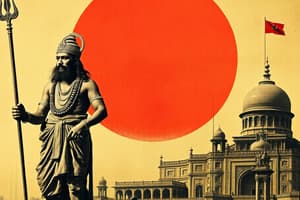Podcast
Questions and Answers
Where was Shivaji Bhonsle born?
Where was Shivaji Bhonsle born?
At what age did Shivaji start his military career?
At what age did Shivaji start his military career?
What was the capital of the Maratha Empire founded by Shivaji?
What was the capital of the Maratha Empire founded by Shivaji?
What was the name of Shivaji's mother who instilled in him the values of bravery, loyalty, and Hinduism?
What was the name of Shivaji's mother who instilled in him the values of bravery, loyalty, and Hinduism?
Signup and view all the answers
What was the name of the treaty signed by Shivaji in 1665, ceding 23 forts to the Mughals?
What was the name of the treaty signed by Shivaji in 1665, ceding 23 forts to the Mughals?
Signup and view all the answers
What is Shivaji remembered as?
What is Shivaji remembered as?
Signup and view all the answers
Study Notes
Early Life and Background
- Shivaji Bhonsle, also known as Shivaji Maharaj, was born on February 19, 1630, in Shivneri Fort, Pune, India
- He was the son of Shahaji Bhonsle, a Maratha general, and Jijabai Bhonsle
- Shivaji was raised by his mother, who instilled in him the values of bravery, loyalty, and Hinduism
Military Career
- Shivaji started his military career at the age of 14, fighting against the Bijapur Sultanate
- He captured the Torna Fort in 1646, marking the beginning of the Maratha Empire
- Shivaji fought against the Mughal Empire, led by Aurangzeb, and successfully defended his kingdom
- He used guerrilla warfare tactics, including ambushes, surprise attacks, and hit-and-run battles
Establishment of the Maratha Empire
- Shivaji founded the Maratha Empire in 1674, with Raigad as its capital
- He established a strong and efficient administrative system, with a council of eight ministers (Ashtapradhan)
- Shivaji encouraged the use of Marathi language and promoted Hinduism in his kingdom
Key Battles and Conquests
- Battle of Pratapgarh (1659): Shivaji defeated the Bijapur Sultanate, capturing the strategic fort of Pratapgarh
- Battle of Purandar (1665): Shivaji defeated the Mughal Empire, but was forced to sign the Treaty of Purandar, ceding 23 forts to the Mughals
- Capture of Salaar Jung (1666): Shivaji defeated the Mughal general, Salaar Jung, and captured the fort of Chakan
Legacy
- Shivaji is remembered as a hero and a symbol of Indian resistance against foreign rule
- He is credited with building a strong and independent Maratha Empire, which lasted for over a century
- Shivaji's military tactics and administrative systems are still studied and revered in India
Early Life and Background
- Shivaji Bhonsle, also known as Shivaji Maharaj, was born on February 19, 1630, in Shivneri Fort, Pune, India
- He was the son of Shahaji Bhonsle, a Maratha general, and Jijabai Bhonsle
- Shivaji's mother instilled in him values of bravery, loyalty, and Hinduism
Military Career
- Shivaji started his military career at the age of 14, fighting against the Bijapur Sultanate
- He captured the Torna Fort in 1646, marking the beginning of the Maratha Empire
- Shivaji successfully defended his kingdom against the Mughal Empire, led by Aurangzeb, using guerrilla warfare tactics
Establishment of the Maratha Empire
- Shivaji founded the Maratha Empire in 1674, with Raigad as its capital
- He established a strong and efficient administrative system, with a council of eight ministers (Ashtapradhan)
- Shivaji encouraged the use of Marathi language and promoted Hinduism in his kingdom
Key Battles and Conquests
- Shivaji defeated the Bijapur Sultanate in the Battle of Pratapgarh (1659), capturing the strategic fort of Pratapgarh
- Shivaji defeated the Mughal Empire in the Battle of Purandar (1665), but was forced to sign the Treaty of Purandar, ceding 23 forts to the Mughals
- Shivaji defeated the Mughal general, Salaar Jung, and captured the fort of Chakan in 1666
Legacy
- Shivaji is remembered as a hero and a symbol of Indian resistance against foreign rule
- He is credited with building a strong and independent Maratha Empire, which lasted for over a century
- Shivaji's military tactics and administrative systems are still studied and revered in India
Studying That Suits You
Use AI to generate personalized quizzes and flashcards to suit your learning preferences.
Description
Learn about the early life and military career of Shivaji Maharaj, the founder of the Maratha Empire. From his birth to his military conquests, test your knowledge of this Indian legend.




